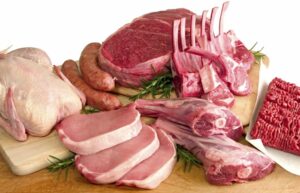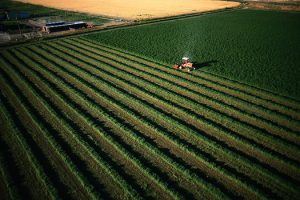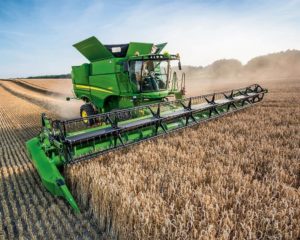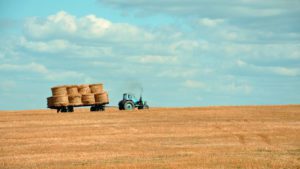
The Ministry of Agrarian Policy and Food of Ukraine has launched a questionnaire website for farmers to find out their readiness and needs before spring field work and sowing, as well as to clarify how the agency can effectively help them at the expense of state funds and international support.
The department wrote about the launch of the corresponding website on its Facebook page on Monday.
“Now millions of Ukrainians rely on us, because you, farmers, are the basis of the economic development of the state. Therefore, the Ministry of Agrarian Policy has taken on additional functions to coordinate the distribution of everything that is necessary to ensure the sowing campaign-2022 (diesel fuel, seed material, fertilizers, protective equipment). A special platform agrostatus.org has been created for this,” the ministry said in a statement.
According to it, the online survey will make it possible to find out the needs of farmers for a successful start of the sowing campaign, to help cover these needs at the expense of the state and international support.
The Ministry of Agrarian Policy specified that agrarians using the service should fill out a special application on the website https://agrostatus.org/ according to their needs, after which the ministry will contact them and coordinate all further actions.

Sales of meat for slaughter in Ukraine (in live weight) in January of this year decreased by 1.5% compared to January 2021, to 307,300 tonnes, milk production – by 1.5%, to 522,100 tonnes, and eggs – by 8.1%, to 934.6 million pieces.
According to the website of the State Statistics Service, as of February 1, 2022, the total number of poultry in Ukraine increased by 0.7% compared to the same date last year, to 193.9 million birds. The number of pigs decreased by 3.4%, to 5.56 million animals, cattle – by 6.5%, to 2.7 million animals (including the number of cows – by 6.6%, to 1 .55 million animals), and sheep and goats – by 3.3%, to 1.09 million animals.
As of the indicated date, the number of cattle and pigs in the households of the population decreased the most – to 1.7 million animals of cattle (9.7% less versus February 1, 2021) and 1.92 million pigs (7.5% less). At the same time, by February 1, 2022, the country recorded an increase in the number of poultry at agricultural enterprises by 2.9%, to 110.9 million birds, and sheep and goats – by 8%, to 165,000 animals.
The population of cows at agricultural enterprises also increased by 0.2%, to 423,700 animals, while the total number of cattle decreased by 0.5%, to 1 million animals.
Sales of poultry for slaughter by agricultural enterprises in January 2022 increased by 3.8% compared to January a year earlier, to 56.96 million birds, sheep and goats – by 60.2%, to 3,700 animals, while sales of pigs decreased by 10.5%, to 0.35 million animals, and cattle – by 0.4%, to 23,100 animals.
Sales of eggs by agricultural enterprises for the specified period decreased by 12.3%, to 570,000 pieces, while the households reduced their sales by 1.4%, to 360,900 pieces.
The State Statistics Service specified that in January of this year, Kyiv region became the leader in production of eggs – 241.1 million eggs (9.3% less compared to January 2021), Khmelnytsky region – 68.6 million pieces (5.2% more), Dnipropetrovsk region – 56.1 million pieces (9.7% less) and Cherkasy region – 52.1 million pieces (13.7% less).
According to the statistics service, in January of this year, Ukrainian agricultural enterprises increased milk production by 6.9% compared to January last year, to 243,300 tonnes, while its production by households decreased by 7.8%, to 278,800 tonnes.
Most milk was produced in Poltava region – 50,900 tonnes (0.2% less), Vinnytsia region – 45,100 tonnes (7.8% less), Khmelnytsky – 40,000 tonnes (2.8% more), as well as Kharkiv and Cherkasy regions – by 34,000 tonnes (more by 2.1% and 2.7% respectively).

The Verkhovna Rada at first reading passed bill No. 3656 on amending the Tax Code of Ukraine with regard to the rate of value added tax on transactions for the supply of certain agricultural products that proposes to reduce the VAT rate from 20% to 14% for the agricultural sector. Some 233 MPs voted in favor of the draft law concerned.
The document provides for amending Paragraph 193.1 of Article 193 of the Tax Code of Ukraine by adding a new subparagraph ‘g’ and establishing 14% VAT on operations for supply to the customs territory and admission into the customs territory of Ukraine of agricultural products classified by the following foreign economic activity codes: 0102 (live bovine animals); 0103 (live swine); 0401 (regarding whole milk), 1001 (wheat), 1002 (rye), 1003 (barley), 1004 (oats), 1005 (corn), 1201 (soybeans), 1204 00 (linseed), 1205 (rapeseeds), 1206 00 (sunflower seeds), 1207 (other oil seeds and oleaginous fruits,), 1212 91 (sugar beet).
“First of all, such a reduction will reduce the tax burden on agricultural producers that in turn will reduce the cost of raw materials by the amount of VAT reduction exactly for processors of such products, whereas, in general, reducing the VAT rate on transactions for selling grains, oilseeds and whole milk will not lead to budget losses, since these goods are not sold to the final manufacturer that is actually VAT payer,” said Mykola Solsky, the head of the Ukrainian Parliamentary Committee on Agrarian Policy and Land Relations, at the presentation of the bill.
According to the explanatory note to the document, which refers to the analysis carried out by UCAB based on data from the USDA and market operators for certain types of oilseeds and grains (sunflower, rapeseed, corn), reducing the VAT rate from 20% to 14% will not lead to large-scale distortions in the structure of VAT receipts/losses for any of the stakeholders (state/enterprise).

The Cabinet of Ministers proposes to abolish support for agricultural producers, for which UAH 4 billion is provided in the 2020 national budget and increase funding for the Pension Fund of Ukraine by UAH 20 billion, to UAH 192 billion.
The materials of amendments to the law on the 2020 national budget of Ukraine, which the government submitted to the leadership of the Verkhovna Rada, were released by MP Oleksiy Honcharenko in the Telegram Channel on Thursday, March 26.
According to the amendments, the Cabinet of Ministers also intends to cut a number of subventions to local budgets, namely for the construction and repair of roads by UAH 3.24 billion, to UAH 18.9 billion; for local elections by more than UAH 2 billion, to UAH 1.3 million.
The amendments also provide for a reduction in the financing of the State Road Agency (Ukravtodor) by UAH 3.27 billion, to UAH 18.9 billion.
Regarding the country’s power bloc, it is proposed that the financing of the Interior Ministry be left at almost the same level at UAH 92.961 billion against the current UAH 92.966 billion. The costs for the Prosecutor General’s Office are proposed to be cut by UAH 50 million, to UAH 7.55 billion.
According to the materials with the proposed changes, funding for the Cabinet of Ministers Secretariat can be reduced by UAH 670 million, to UAH 930 million; the Supreme Court by UAH 110 million, to UAH 2.27 billion, the Verkhovna Rada apparatus by UAH 11 million, to UAH 1.989 billion.

Ukrainian farmers under the government-funded program to support acquisition of Ukrainian machinery and equipment bought it for the amount of over UAH 5.77 billion in 2019, which is 31.2% more than in 2018, Secretary of the National Committee for Industrial Development Olena Salikhova has said.
“At the same time, the amount of compensation [25% of the cost] for the purchased equipment according to the Ministry of Economic Development, Trade and Agriculture, in fact in 2019 amounted to UAH 640 million (applications submitted by farmers in September were satisfied), while applications filed in October-November for the amount of UAH 563 million were not compensated, but the equipment was purchased,” she said during a Thursday working meeting with Deputy Minister of Economic Development, Trade and Agriculture Taras Vysotsky with agricultural associations devoted to support programs for 2020.
In turn, Vysotsky said that this program was underfunded due to the fact that the budget provided for these purposes less funds (UAH 682 million) than the demand for this program.
“Farmers bought a lot more equipment under the program than there were funds in the budget, so we can discuss the possibility of considering this compensation in 2020. Our position is to complete all the programs,” the deputy minister said.
He said that in the fourth quarter, when there was no money left for compensation, farmers purchased equipment for UAH 2 billion, which means compensation for another UAH 500 million.

The World Bank invites the Ukrainian government to consider the creation of the Partial Credit Guarantee Agency as a special financial tool that will allow small and medium-sized agricultural producers to receive financing for the acquisition of land after the launch of the market. “Partial guarantee for loan contributions is the best option for Ukraine,” Lead Financial Sector Specialist for the Finance and Markets Global Practice in Belarus, Moldova and Ukraine Vahe Vardanyan said at a press conference on Thursday.
According to him, at least half of the countries have introduced government partial guarantees as a way to facilitate access to loans. There is also the practice of creating specialized partial guarantees designed specifically for agriculture, for example, in Mexico and Colombia, he said.
In order to receive partial guarantees, the farmer applies for a loan to a bank, which analyzes the application and determines the need for partial guarantee, then the bank contacts the Credit Guarantee Agency. The latter checks the compliance criteria and carries out risk analysis, approves and provides a partial credit guarantee, receives a fee from the bank for issuing the guarantee. Further, the bank provides a loan secured by partial guarantees.
In addition, the World Bank said that the Credit Guarantee Agency (company/fund) is usually a non-banking financial institution, it has its own: management, governance, capital, operating procedures. The legal structure of the agency allows for a mixed type of ownership at a certain stage, the government is not always a full owner. The National Commission for Financial Service Markets Regulation exercises supervision as over a non-banking financial institution.
All over the world, guarantee agencies are state-owned, co-financing, public private partnership is possible, but this is about joining after the first year of the institutions’ work, World Bank Country Director for Belarus, Ukraine and Moldova Satu Kahkonen said.
CREDIT GUARANTEE AGENCY, FARMERS, FINANCE PURCHASE, LAND, WORLD BANK